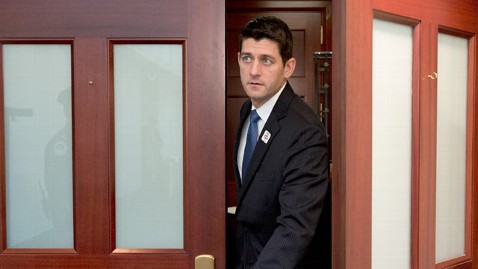Will Fractured House Republicans Unite on Budget?

Jacquelyn Martin/AP Photo
Tomorrow morning, House Budget Chairman Paul Ryan will release the latest version of his budget blueprint, setting the federal government on a course to balance annual revenue and spending levels by the year 2023.
Until now, the former Republican vice presidential nominee has never proposed a budget that balanced in just a decade.
"I wouldn't expect big surprises from us [Tuesday]. We're making some additional modest changes to get to balance." Ryan, R-Wis., told reporters at briefing last week. "We're adding some other policies that finish the job, but I wouldn't expect big surprises from us next week. I don't want to set irrational expectations."
This time, Ryan points to two unlikely factors that actually help achieve the conservative goal: revenue and sequestration.
"Revenue went up significantly two months ago with the "Fiscal Cliff" deal. The baselines changed. We're not going to refight that fight," Ryan said, referring to $600 billion in new tax revenue President Obama secured in the deal. "We also have some lower spending and lower deficits in that baseline as well [as a result of sequestration]."
While Ryan is the chief author of the GOP's budget proposal, he does not work alone and there are varying perspectives. The Budget committee is a melting pot of lawmakers representing the interests of the House's most powerful committees, especially the Ways and Means committee, which Ryan also sits on, and the Appropriations committee.
"The starting point is the budget," Georgia Republican Rep. Tom Price, the vice chairman of the Budget committee, said. "It's our list of priorities, our list of the visions that we have for the country."
But some GOP insiders confidentially question whether Ryan can pass his budget out of a committee markup this week. Republicans hold a narrow 22-17 seat advantage over Democrats on the committee. With Democrats ideologically against his proposals, Ryan can only afford losing two Republicans before a third dissenter stalls the resolution in committee.
"Ryan's budget is facing opposition from many sides, including within his own committee," one Republican congressional source said on the condition of anonymity. "He loses votes on everything from Medicare and entitlement changes to his drastic discretionary cuts, and it will be difficult for him to pass his budget out of committee, let alone the House floor."
While Ryan would not elaborate on any details from his new budget ahead of Tuesday's release, there are reports he could raise the threshold at which people are protected from changes to the Medicare eligibility age.
On the House floor, Republicans hold a 232-200 majority, plus there are three vacant seats. With 216 votes constituting a simple majority, House Speaker John Boehner and Ryan can lose just 16 rank and file Republicans. Last year 10 Republicans voted against the Ryan budget on the floor, but in the new session of Congress where the GOP's majority is slimmer than the last session, Boehner has needed Democratic votes to pass several essential pieces of legislation.
At a pen and pad briefing last week, Ryan did his best to assure reporters that all Republican members on the committee are "unified."
"Everybody sees it my way. We're all fine," Ryan joked. "We have members who have various priorities and preferences coming from different districts but on the point of getting an agreement that gets cuts and reforms, that gets us on the path to balance, we are completely unified."
While some of the most conservative Republicans griped in the past that Ryan's budgets did not cut spending quickly enough, Rep. Tom Cole, a member of both the Budget and Appropriations committees, called Ryan's bid the "most aggressive budget by any majority in recent years."
While meeting the spending caps could puzzle the appropriators' work later this year, Cole urged House Republicans to rally around Ryan's proposal. He predicted it will ultimately pass, but also acknowledged the uncertainty ahead as the House prepares for a vote on the floor next week.
"We can't have 20 members on each end of the conference dictating what's going to happen. If you satisfy 20 on right, you're going to lose 20 on left," Cole said in a phone call over the weekend. "We don't have much margin of error."
Senate Democrats and President Obama are also preparing their own budget proposals. Ryan warned against buying into "gimmicks" in their plans that count savings from hurricane relief and war spending, which are both factored into the Congressional Budget Office's baseline.
"When you're looking at a budget, you've got a watch the gimmicks," Ryan warned. "We are not planning on being in Afghanistan for a decade. Nobody is. We know the deadline, but the CBO in their baseline assumes we're going to be in Afghanistan for a decade. And if we pull out in 2014, which is the mutually agreed to plan, that saves you all this money. We had one hurricane that was an enormous hurricane that was kind of a one-time event. The last time we had one like this was '05. Are we going to have a supplemental like that each and every year for the decade? CBO says so in their baseline. That's not credible."
"Balance is balance no matter what," he continued. "I could show balance using that CBO baseline and it would show we're cutting a whole bunch more spending than what we're going to show. We're actually going to claim less spending reductions because we're going to claim the real spending reductions, not the fake spending reductions."